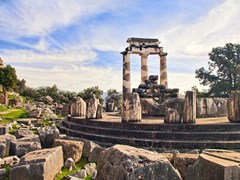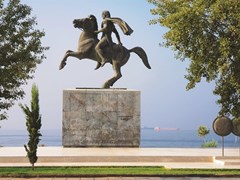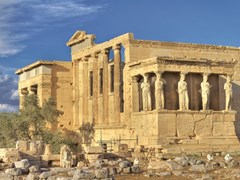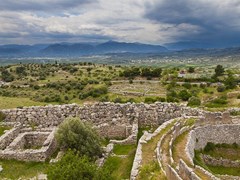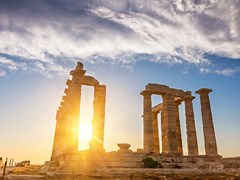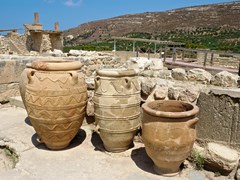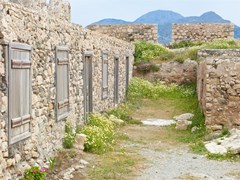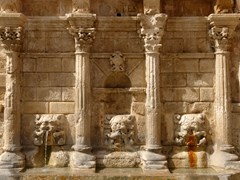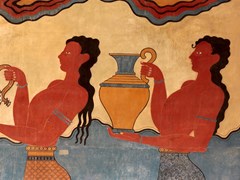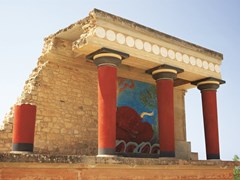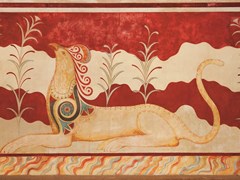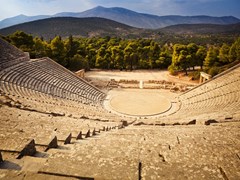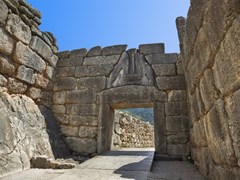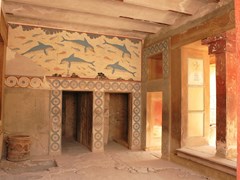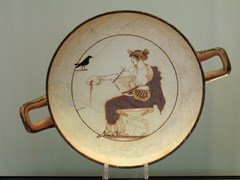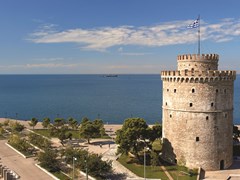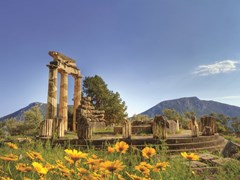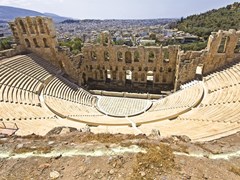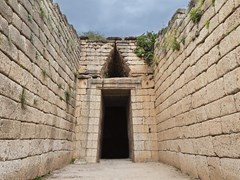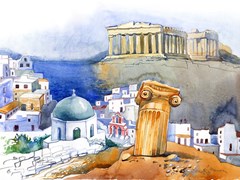Cradle of Western Civilization
The history of Great Hellas can be traced to Stone Age hunters: it’s about 4000 years old. Doubtless, Greek civilization has a great significance for the entire modern world. World arts, science, politics, philosophy and languages are all closely connected with the culture and history of Greece.
Crete (2800 – 1500 BC)
Minoan civilization is a higher civilization that appeared on the island of Crete approximately in 6th century BC in the Neolithic epoch. The profitable geographical position of Greece at the crossroads of the trade and shipping routes was one of the factors of its cultural and historical development and the creation of the civilization that still impresses with its grandeur and grace.
It’s notable that women played an important role in the rapid growth and prosperity of Crete civilization. At those times woman held a high position in the Cretan society, which was lost in the following patriarchal centuries. By 1700 B.C. the Minoans had developed a more efficient written language for the maintenance of records and communication within the vast commercial empire. They abandoned the pictographic form of writing that they had originally used and created a linear script called Linear A. Around 1400 BC Knossos was sacked and burned to the ground. The Minoan civilization had come to its end.
Archaean period (1400-1100 BC)
Approximately in 1400 BC the Archaeans settled on the peninsula of Peloponnese. There are still a lot of disputes about their origin. According to one version this was a tribe of North Greece, others believe that this tribe came from Central Europe. Anyway, it were them, who brought the pagan cult of Olympic Gods and new elements of culture to Greece. This historical period was legendary, as goes from the poems by Homer and numerous myths about Greek gods and heroes.
The Trojan War, depicted in ancient literature (the Iliad, the Odyssey) and arts, was the culmination of the Archean period and the first step to its fall. The Mycenaean civilization collapsed around 1100 BC.
Homeric Age (1200-800 BC)
The origin of the Dorians is unknown. According to the legend they were the descendants of Hercules. At first, after the Dorian invasion the country was falling apart, but soon the situation changed and a new civilization was formed from the combination of the Mycenaean, Cretan, Archaean, Asian and Dorian cultures. This is the time, when the Greek language was formed and the great Homer wrote his eternal works filled with the flavour of his epoch.
Archaic period (800 -480 BC)
In the Archaic period rose and flourished the polis (city states), appeared classical philosophy, theatre and written poetry due to reuse of written language, which was lost in the Dark Ages. One of the significant events of this period was the creation of the Peloponnesian Union, headed by Sparta. This period ended with Xerxes’ invasion in Greece.
Classical Period (480 - 323 BC)
It was a 200 year period in Greek culture lasting from the 5th through 4th centuries BC. In this period the Greek arts, culture and architecture were spread throughout the known world thanks to Alexander the Great.
Hellenistic period (323 - 146 BC)
The death of Alexander the Great undoubtedly speeded the fragmentation of the great empire. Alexander’s military leaders divided the country among themselves: Creece and Macedonia fell to Antipater, Thrace to Lysimachus, Asia Minor - to Antigonus, Babylonia to Seleucus, Egypt - to Ptolomaeus. From the Roman invaders in 148 BC fell Macedonia and Greece, the last fell the kingdom of Ptolomaeus in Egypt.
Roman Period (146 BC - 330 AD)
The Roman Period started with the Roman victory over the Corinthians at the Battle of Corinth in 146 BC and lasted until the reestablishment of Byzantium.
As the majority of great civilizations, the Roman civilization underwent self-destruction due to corruption, idle way of life and greed.
Byzantine Period (330 - 1453 AD)
In this period the basis for Orthodox Christianity in Greece, Russia and in the Balkans was established.
At the time of Emperor Justinian I the Byzantine Empire reached the apogee of its might and became the biggest power in the Mediterranean. In 1453 the great civilization fell under the attacks of the Ottoman invaders, getting under the power of the Ottoman Empire.
Ottoman Greece (1453 - 1821)
This period was one of the hardest in the history of Greece. Though the Turks left the Greeks the freedom of faith, the Greek nation never stopped to fight for its independence.
Revolution (1821 - 1832)
The date of the beginning of revolution is 25th of March, 1821. The leading role was played by the Orthodox Church, when the patriarch raised the flag of the revolution. After a year of the hard and embittered fight, the National Assembly proclaimed the independence of Greece. However, inner controversies lead to the beginning of Civil War 1823-1825. Two years later, in 1827 the first President of Greece was elected. England, Russia and France became guarantors of the autonomous status of Greece. In 1832, according to the concluded peace treaty of Andrianople, Turkey acknowledged the independence of Greek State.
New Time
The period from 1830 through 1922 is considered to be the time of political mess. Under the influence of the leading world powers, which contributed to the obtaining of its independence, Greece was forced to take their opinion into account. So, in 1862 George I, Dutch Prince was elected as President of Greece. Thanks to this fact Ionian Islands, Thessaly and part of Epirus were given back to Greece. At the beginning of the 20th century, in course of the Balkan Wars in 1912 – 1913, Greece got the Aegean islands, Crete, Epirus and Macedonia, and after the end of the First World War, Greece got Thrace and Izmir. 1922 was marked by so called “catastrophe of Asia Minor”, when Greece had to forget its imperial plans about freeing the coastal part of Asia Minor from the Turkish rule and regaining its past glory.

